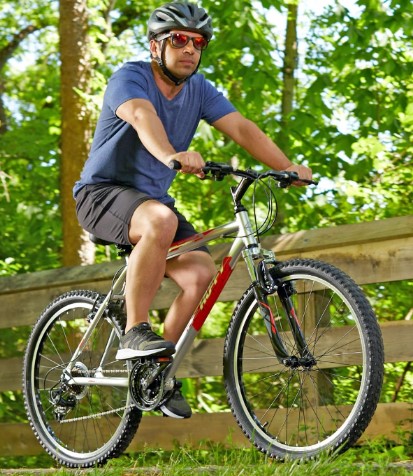Cycling is addictive, but most of us cycle for fun or commuting reasons. But is that the only reason you should cycle? What does cycling do for your body?
Interestingly, cycling has numerous effects on the body. It tones the muscles, burns calories, improves coordination and posture, strengthens the core and legs, and improves stamina and body strength, among many others.
So, there’s so much that cycling can do for your body. Whether you want to cut on your tummy and shape your body or to keep fit, cycling can help you do that. Even studies show that cycling suits beginners and those living a sedentary lifestyle.
To explain more, we’ll discuss all those things that cycling does to your body. We’ll also examine the drawbacks, as no physical activity is perfect.
Here we go!

What Does Cycling Do for Your Body?
When it comes to attaining a good body shape, cycling is one idea you can implement and not be disappointed. Whether you choose to ride an exercise bike or an outdoor bike (Check on Amazon), cycling can do the following to your body:
1. Cycling Tones Your Body Muscles
Cycling can help you tone your lower body muscles, such as the hamstrings, calves, hip muscles, glutes, and quads. By regularly cycling and tackling more brutal hills and other challenges, you push your body more, which engages and tones your muscles more.
2. Cycling Burns Calories (Can Help with Weight Loss)
Regular and high-intensity cycling can help you burn extra calories and eventually lose weight. So, it’s an effective weight management strategy, but it takes lots of dedication to the routine and patience.
Experts, however, recommend cycling for weight loss and combining it with other drills such as running, strength training, and even swimming.
The goal is to improve your metabolism and cut unnecessary calories: the higher your metabolism, the greater the calorie-burning process. So, while there are no guarantees, you can cycle for a better and leaner body shape.
3. Cycling Improves Coordination and Posture
It takes a lot of body positioning and coordination to ride a bike. And as you try to stabilize and balance your body above the cycle, you improve your general coordination and balance.
Remember, our sense of coordination and good posture declines with inactivity and aging. You can, however, slow the rate by cycling regularly. Eventually, you get old and lose your balance and coordination, but you can delay it with cycling.
Overall, the more coordination and good posture you enjoy, the fewer the chances of falling and fracturing something. So, your likelihood of suffering fall-related injuries is much lower.
4. Cycling Strengthens the Core and Legs
The body core and the legs are probably two of the most involved body parts when cycling. So, it doesn’t surprise me that they benefit the most.
Ideally, cycling is low-impact unless you go all out. So it doesn’t strain your leg muscles or core. Instead, it strengthens them.
But again, the results are much better when you cycle regularly and combine it with a bit of weight-lifting workouts such as lunges, squads, and bench presses.
Depending on your routine, you can also do combined exercising several times a week.
5. Cycling Improves Stamina and Body Strength
Regular cycling is suitable for your metabolism. It stimulates a higher metabolism rate, enabling you to endure more physical activity.
In the long run, that improves your stamina. Meanwhile, cycling strengthens your bones. They become stronger, and that translates to a more muscular body.

Other Benefits of Cycling for Your Body
In addition to the above contributions, cycling is beneficial for your body because of these reasons:
· Disease Protection
Cycling is good for your health. You can cycle to improve your body’s immunity and be able to fight off serious diseases. For example, cycling helps with lowering cholesterol.
Doing so enables you to avoid cardiovascular issues such as heart attack, hypertension, and stroke. That’s not all. Regular cycling can help you manage obesity and associated risks.
Moreover, you can enjoy an immune boost against type 2 diabetes.
· Stress Relief (Mood Boost)
Cycling is a distraction in its own right but a good one. It enables your body to release the happy (or mood-enhancing) hormone Endorphin, which helps you have a more positive outlook.
It’s fair to say that you temporarily forget about your problems when you cycle. You tend to focus on having fun, reaching milestones, and overcoming challenges.
· Better Sleep
Cycling is not high-impact, meaning it does not stress your body much. Instead, it lowers your stress levels by stimulating endorphins release, which calms you down. So, it’s easy to sleep after a day of cycling.
· Brain Power
Cycling is also good for your brain health. By promoting the release of mood enhancer endorphin, cycling energizes your brain. You become more relaxed and can think better.
Your overall cognitive functions improve, as do your confidence and ability to take on challenges.
What Are the Risks of Cycling?
Cycling, especially high-intensity cycling, has a few safety risks you should be wary of. The most likely risk is suffering an injury.
Without the right cycling gear, especially a helmet (Check on Amazon), it’s easy to suffer a severe injury when you fall off your bike. The risk is even much higher on the streets with so much traffic.
The other issue is that you cannot cycle all the time. Bad weather, especially heavy rain, can be a hindrance. You cannot see clearly, and the slippery roads make it easy for you to fall.

FAQs
What Does Biking Help You with?
Biking helps you with several things, which include:
- Disease protection, especially obesity, diabetes, stroke, and hypertension
- Weight loss by shedding unnecessary calories
- Leg and core strengthening
- Body stamina
- Muscle toning
- Better coordination and balance
- Brain power
- Stress relief (mood enhancing)
What Muscles Does Cycling Tone?
Cycling mostly tones the muscles of your lower body. That includes the quads, calves, hamstrings, glutes, and hip muscles. The more you cycle, the more you engage and activate these muscles translates to flexibility and endurance.
So, you become more flexible and more enduring.
Does Biking Help You Lose Weight?
Generally, the weight loss process is gradual when it comes to cycling. It doesn’t happen overnight but gradually with regular cycling, especially high-intensity biking.
You cannot, however, depend on biking alone to lose weight. It’ll help to also look after your diet (avoid fatty foods) and combine cycling with other exercise routines such as strength training and running.
Is Biking Good Exercise?
Biking is low impact, but it’s overall good exercise. You can bike to lose weight, strengthen the core and legs, tone the muscles and improve posture.
Mentally, cycling enables your body to release endorphins which improve your mood. As for your heart, cycling reduces the risk of cholesterol-related issues such as heart disease, heart attack, hypertension, and stroke.
Does Cycling Help with Running?
Cycling alone is not as effective as combining it with running. Running stimulates your energy cells, and that helps you cycle more. On the other hand, cycling improves your coordination and balance, which you need for running, not forgetting endurance.
So, yes, cycling helps with running, and for that reason, it’s recommended to combine the two for the best workout result and athleticism. Remember, both cycling and running are aerobic exercises, and so are walking and swimming.
Does Biking Make Your Legs Bigger?
Regular biking mostly tones your lower body muscles, which means it targets your leg muscles, among others. The more you ride, the more you engage the leg muscles, which can make them bigger.
You’ll, however, have better results if you combine cycling with weight training.
Is Cycling Good Cardio?
Yes, cycling is good cardio. Regular cycling improves your heart rate and blood flow and reduces the risk of a sharp blood pressure rise and cholesterol complications.
You can cycle to lower bad cholesterol, which confers your immunity against stroke, hypertension, and heart attack. So, consider cycling to improve your cardiovascular health.
Is Biking a Good Workout?
Biking is a good workout for your body, brain, and heart. Physically, cycling can shape your body by helping you shed extra fat. It can also tone lower body muscles and improve joint mobility.
Mentally, cycling energizes your brain, and when it comes to the heart, it reduces cholesterol and minimizes the risks of heart conditions.
Is Cycling Good for Your Butt?
Cycling acts on your glutes, making it good for your butt. It strengthens and tones the glutes, among other muscles, which makes it a good workout for the butt.
What Does Biking Do for Your Body Shape?
Cycling does several things to your body shape. First, it enables you to burn extra calories, including belly fat, thus effective in giving you a leaner look.
Cycling also strengthens your core and leg and tones your muscles. Moreover, it improves your posture and coordination. So, you can cycle to attain a more refined body shape, especially a leaner and well-toned one.
Can Cycling Reduce Belly fat?
While cycling may not be the most effective ab exerciser, you can cycle regularly to shed belly fat. The belly muscles don’t work as hard as the glutes and quads, but you can still torch their extra fat.
It, however, may take more time than a person doing sit-ups, planks, or any other ab exercise.
In Summary; What Does Cycling Do for Your Body?
As shared, cycling does different things for your body. It tones your body muscles, torches the extra calories, boosts your coordination and posture, strengthens your core and leg, and enhances your body stamina and strength.
Those are just some effects that come with consistent cycling. It’s essential, however, to wear the right biking gear, more so the helmet, to stay safe while cycling.
Relevant:

